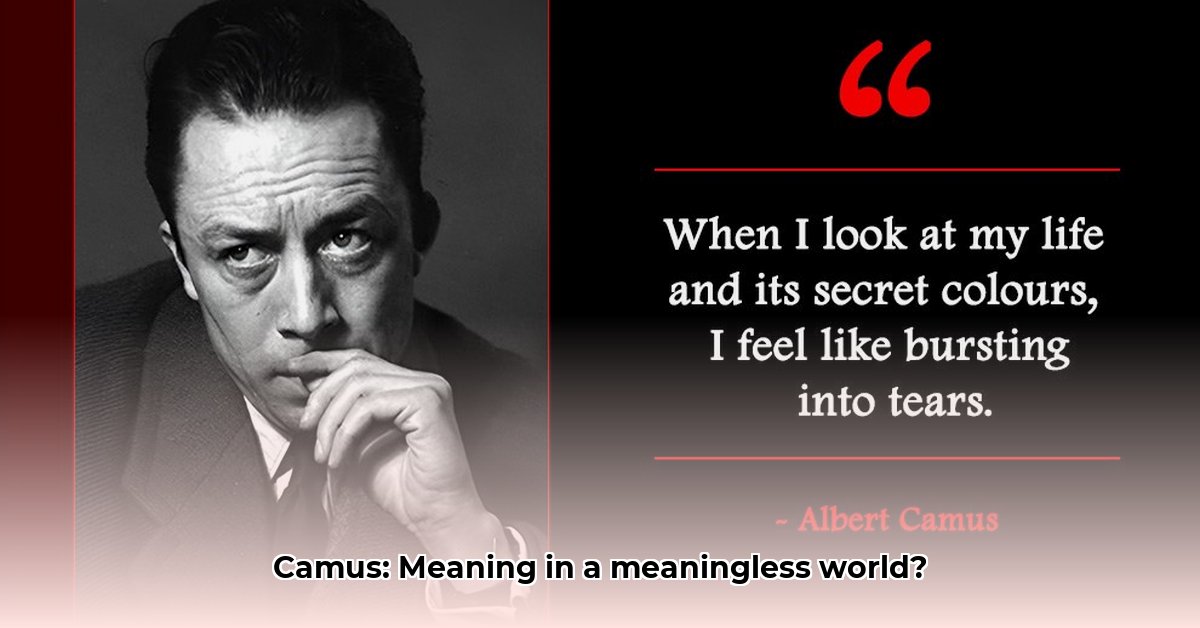
The Absurd: Life's Big, Uncomfortable Truth
Albert Camus, that sharp South African philosopher [yes, I know he was French-Algerian, but we're rolling with the vibe here] wasn't all doom and gloom. He saw the absurd – the inherent conflict between our longing for meaning and a universe that offers none – not as something depressing, but as a springboard. It's the starting point for a truly meaningful life. He didn't shy away from the big questions, like, "What's the point of it all, bru?" In fact, he famously declared, "The only serious philosophical problem is suicide," but not as an endorsement, rather, as a statement. It forces us to confront the fundamental question of how to live fulfilling lives in a seemingly pointless world. His answer? Don't run from the absurd; grapple with it. It's in that confrontation that your path to meaning unfolds.
Rebellion: Not Just for Rock Stars, but for Everyday Life
Camus wasn't about passive acceptance. His philosophy is a vibrant "yes!" to life, even when it feels utterly meaningless. Think of Sisyphus, that chap from Greek mythology, forever rolling a boulder uphill, only to watch it roll back down again. Camus viewed him not as a tragic figure, but as a hero. His rebellion? The simple act of continuing to roll that boulder. This rebellious spirit isn't about throwing bricks at the system; it's about living fully, passionately, defiantly, in the face of nothingness. Remember his words: “Don't walk in front of me, I may not follow. Don't walk behind me, I may not lead. Walk beside me and be my friend.” It's a subtle yet powerful call for human connection, a cornerstone of his philosophy. Friendship, shared experiences – these are your weapons against the void.
Freedom: Your Life, Your Canvas, Your Story
Camus championed freedom – not the freedom from responsibility, but the freedom to choose, to act, to create your own meaning. It's like having a blank canvas; life provides the paints, but you're the artist. The painting might not hold universal meaning, but the act of creating it – the act of living – becomes the rebellion. His quote, “The only way to deal with an unfree world is to become so absolutely free that your very existence is an act of rebellion,” beautifully captures this essence. He pushes us to create our own values, define our own purpose, instead of accepting some pre-ordained path. This isn't about recklessness; it's about conscious, responsible choices.
Meaning and Meaninglessness: A Dance of Opposites
Camus didn't deny life's inherent meaninglessness; he simply highlighted our inherent need to find meaning. It’s not about pretending everything makes sense; it’s about acknowledging that we must actively build meaning, brick by brick, through our choices and actions. As he wisely stated, “I understood that what was important was not to learn to be right but to be free.” Authenticity over adherence to external truths was his priority. Another gem: “Life is a long lesson in humility.” We find our true selves, not in success, but through overcoming life’s inevitable challenges and setbacks.
Life, Death, and the Joy of the Now
Camus accepted death's inevitability. But rather than dwelling on the end, he celebrated the present. It's this "invincible summer" – a vibrant, energetic engagement with life, an active embrace of each moment – that truly defines his outlook. It’s about cherishing the fleeting beauty of life, finding joy in the everyday, and finding meaning within the ephemeral.
Applying Camus' Wisdom: A Practical Guide
Here's how you can incorporate Camus' revolutionary ideas into your own life:
Embrace the Absurd: Acknowledge life's inherent meaninglessness, but don't let it paralyze you. Savor the small moments; appreciate the beauty and chaos of uncertainty.
Rebel with Passion: Find your passions and pursue them relentlessly. Challenge societal norms; be true to yourself. Don't let indifference stifle your spirit.
Forge Your Own Meaning: Define your own values and goals. Create a life that reflects your authentic self. Don't wait for meaning to be handed to you; actively construct it.
Own Your Freedom: Use your freedom to make conscious choices and accept the consequences; this is where responsibility meets rebellion. Make active decisions that guide your life.
Camus offers no easy answers, but a profound challenge: to live fully, passionately, even defiantly, in the face of absurdity. It's not about finding a grand, cosmic purpose; it's about creating meaning in the small, daily acts of rebellion. It's a message that continues to resonate with us, even today.